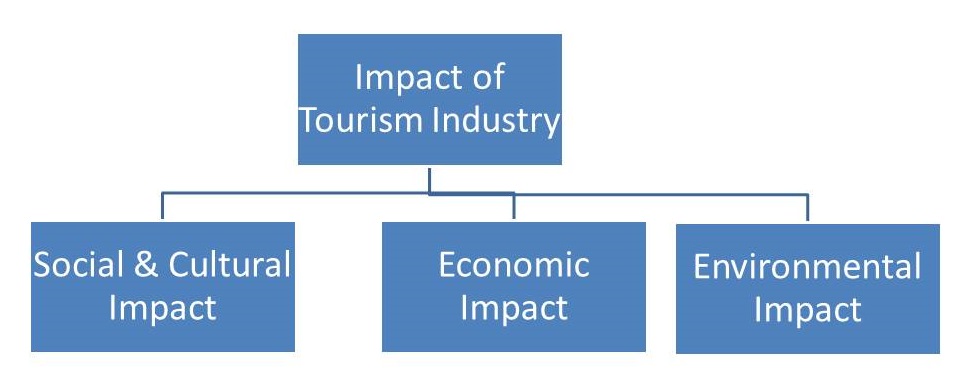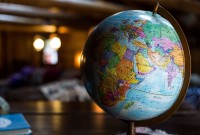- Home
- Business Processes
- Industry Knowledge
- Aerospace Industry
- Automotive Industry
- Banking Domain
- BFSI Industry
- Consumer/ FMCG Industry
- Chemicals Industry
- Engineering & Construction
- Energy Industry
- Education Domain
- Finance Domain
- Hospitality Domain
- Healthcare Industry
- Insurance Domain
- Retail Industry
- Travel and Tourism Domain
- Telecom Industry
- Leadership Skills
- eLearning
- Home
- Domain Knowledge
- Travel and Tourism Domain
- Impact of Tourism Industry
Impact of Tourism Industry
How does Tourism Industry impact a country? The impact of the tourism industry can be classified into the social & cultural impact, economic impact, and environmental impact. Social & cultural impact signifies the impact which it creates in terms of social changes. The economic impact can be quantified in terms of monetary benefits and overall economic development of the society. Environmental impact refers to the impact on nature and the surrounding areas.
Travel and Tourism have become a full-grown industry over a period of time. Tourism is often described as one of the world’s largest industries. It employs millions of people, has a turnover in billions of dollars, and encourages millions of people to travel. In other words, it is a substantial economic sector and economists bring a level of discipline to its analysis. Let’s understand how it impacts all of us. How does Tourism Industry impact a country? The impact of Tourism industry can be classified into the social & cultural impact, economic impact and environmental impact.
There is no doubt that economics has made a fundamental contribution to the study and understanding of tourism, evidenced by the establishment of the journal Tourism Economics in the 1990s. There are always both the positive and negative consequences of tourism for a destination. On one hand, tourism can bring economic benefits to a destination; and on the other hand, there are associated economic costs of tourism to a destination.
Similarly, tourism has a major issue of the consequences of tourism for the environment. This is a complex area as, whilst tourism is dependent upon environmental quality to attract and support visitors, it also can have a detrimental effect upon those very environments – and their climate.
Social & Cultural Impact of Tourism
Social & cultural impact signifies the impact which it creates in terms of social changes in the lives of local people, improvements in infrastructure, lifestyle changes etc. Tourism may have different effects on the social and cultural aspects of life in a particular region depending on the strengths of the region. The effect can be positive or negative.
Tours can be within national boundaries or in any place in the world. Such a decision will have an impact on the economy of both, the country of origin and the tourist’s destination site. Tours also focus on unique natural or geographical features like the coastline, islands, mountains, health resorts, countryside, etc. At such locations, the provision of tourist services and the pressure of tourists are bound to have impacts on the environment, economy, and local social practices and on the people.
Read more on the social and cultural impact of tourism!
Economic Impact of Tourism
The economic impact can be quantified in terms of monetary benefits and overall economic development of the society. The tourism industry has contributed to the economic growth of a country through factors like industrialization, education, advanced technology, a higher number of qualified professionals, opening up of foreign markets, liberal trade policies, and better advertising and strategic marketing.
The above factors collectively boost the economic reserves of the region thus leading to a rise in income and better disposable income. Tourism can also benefit economies at regional and local levels, as money comes into urban and rural areas which in turn stimulates new business enterprises, greater markets and promotes a more positive image of the area. The income generated helps the national balance of payments, earning revenue through direct taxation, as well as from indirect taxes on goods and services purchased by the tourists. Read more about the economic impact of tourism!

Environmental impact of Tourism
Environmental impact refers to the impact on nature and the surrounding areas. The environment is the surrounding atmosphere or condition for existence. The impact of tourism on the environment is both positive and negative. In order to attract more tourism special emphasis is given on the overall beautification of the surroundings; regular planting of trees and landscaping are done to enhance aesthetics. Huge investment is done to improve the facilities in the area like sitting areas, shades, proper sanitation, drinking water, etc. More emphasis is given to preserve the monuments, heritage structures to attract more tourists. On the other hand, Any kind of development requires some interference with nature. Overdevelopment comes at the cost of nature. There may be damage to the natural flora and fauna. Local people are displaced for want of coastal area development. With more people in the area, more natural resources are required which leads to depletion of natural resources. Waste disposal problems crop up and without proper measures to handle this problem, it may worsen the situation. Due to more footfalls, more transport, more noise, improper waste disposal, pollution increases in the area and disturbs the ecological balance of the region.
Read more on the environmental impact of tourism!
Related Links
You May Also Like
-
Social & Cultural Impact of Tourism
Tourism may have different effects on the social and cultural aspects of life in a particular region depending on the strengths of the region. The effect can be positive or negative. Tours also focus on unique natural or geographical features like the coastline, islands, mountains, health resorts, countryside, etc. At such locations, the provision of tourist services and the pressure of tourists are bound to have impacts on the environment, economy, and local social practices and on the people.
-
Overview of Hospitality Industry
Hospitality is the act of kindness in welcoming and looking after the basic needs of customers. The hospitality industry is a broad group of businesses that provide services to customers. The industry can be broken down into three basic areas: accommodations, food and beverage, and travel and tourism. Hospitality is actually one facet of the service industry. It primarily involves addressing customer satisfaction and catering to the needs of guests.
-
Components of Tourism Industry
The tourism sector is a range of businesses and organizations involved in delivering the tourism product. All the elements of tourism are related and interact; in essence, the tourism industry is a system of customers and suppliers who demand and supply tourism products and services. In relation to tourism, very often you will come across terms like tourism products and services. These components of travel and tourism can be broadly divided into six key areas highlighted below.
-
Environmental Impact of Tourism Industry
The environment is the surrounding atmosphere or condition for existence. The impact of tourism on the environment is both positive and negative. This article considers the major issue of the consequences of tourism for the environment. This is a complex area as, whilst tourism is dependent upon environmental quality to attract and support visitors, it also can have a detrimental effect upon those very environments – and their climate.
-
How does Tourism Industry impact a country? The impact of the tourism industry can be classified into the social & cultural impact, economic impact, and environmental impact. Social & cultural impact signifies the impact which it creates in terms of social changes. The economic impact can be quantified in terms of monetary benefits and overall economic development of the society. Environmental impact refers to the impact on nature and the surrounding areas.
-
We all travel and have been a tourist, perhaps many times in our life. Tourism and tourist are so common words that they find mention in newspapers and magazines almost on a daily basis. In spite of its popularity, have you ever deliberated what the definition of travel and tourism is? What components constitute the tourism industry? Who qualifies to be called a tourist? Well, this article attempts to explore the words "travel”, “tourism” and "tourist'- both technically as well as conceptually.
-
Economic Impact of Tourism Industry
The tourism industry has contributed to the economic growth of a country through factors like industrialization, education, advanced technology, a higher number of qualified professionals, opening up of foreign markets, liberal trade policies, and better advertising and strategic marketing. The income generated helps the national balance of payments, earning revenue through direct taxation, as well as from indirect taxes on goods and services purchased by the tourists.
-
Challenges in the Tourism Industry
Top challenges confronting tourism are taxation, travel marketing, infrastructure issues, and security and cross border regulations. Too many tourism destinations are not prepared for visitors. Tourists or travelers can at times deem travel marketing to be exaggerated. Another major challenge that the tourism industry faces is the fluctuating rates and cost inflation. New challenges seem to arise quickly impacting the industry as a whole.
-
Wealthy people have always traveled to distant parts of the world, to see great buildings, works of art, learn new languages, and experience new cultures, and to taste different cuisines. There has been an up-trend in tourism over the last few decades and now national or international travel for short breaks is very common. Tourists have a wide range of budgets and tastes, and a wide variety of resorts and hotels have been developed to cater for them.
Explore Our Free Training Articles or
Sign Up to Start With Our eLearning Courses

About Us
Learning
© 2023 TechnoFunc, All Rights Reserved









